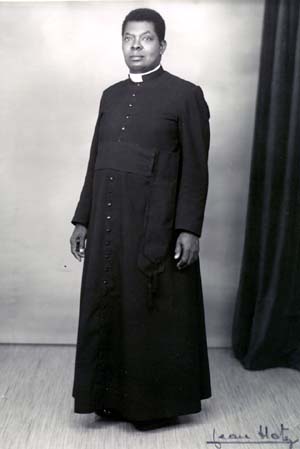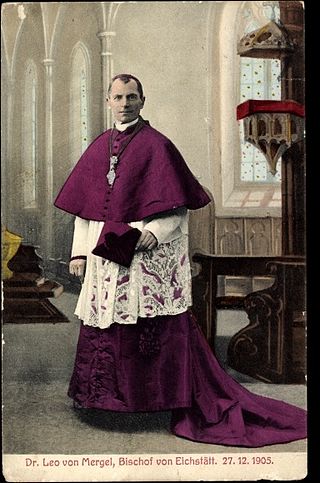
A surplice is a liturgical vestment of Western Christianity. The surplice is in the form of a tunic of white linen or cotton fabric, reaching to the knees, with wide or moderately wide sleeves.

The cassock or soutane is a Christian clerical clothing coat used by the clergy and male religious of the Oriental Orthodox Churches, Eastern Orthodox Church and the Catholic Church, in addition to some clergy in certain Protestant denominations such as Anglicans and Lutherans. "Ankle-length garment" is the literal meaning of the corresponding Latin term, vestis talaris. It is related to the habits traditionally worn by nuns, monks, and friars.

The biretta is a square cap with three or four peaks or horns, sometimes surmounted by a tuft. Traditionally the three-peaked biretta is worn by Christian clergy, especially Roman Catholic clergy, as well as some Lutheran and Anglican clergy. A four-peaked biretta is worn as academic dress by those holding a doctoral degree from a pontifical faculty or pontifical university or faculty. Occasionally the biretta is worn by advocates in law courts, for instance the advocates in the Channel Islands.

A clergy house is the residence, or former residence, of one or more priests or ministers of a given religion. Residences of this type can have a variety of names, such as manse, parsonage, rectory, or vicarage.
The General Convention is the primary governing and legislative body of the Episcopal Church in the United States of America. With the exception of the Bible, the Book of Common Prayer, and the Constitution and Canons, it is the ultimate authority in the Episcopal Church, being the bureaucratic facility through which the collegial function of the episcopate is exercised. General Convention comprises two houses: the House of Deputies and the House of Bishops. It meets regularly once every three years; however, the House of Bishops meets regularly in between sessions of General Convention. The Bishops have the right to call special meetings of General Convention.
Canon is a Christian title usually used to refer to a member of certain bodies in subject to an ecclesiastical rule.
Clerical clothing is non-liturgical clothing worn exclusively by clergy. It is distinct from vestments in that it is not reserved specifically for use in the liturgy. Practices vary: clerical clothing is sometimes worn under vestments, and sometimes as the everyday clothing or street wear of a priest, minister, or other clergy member. Eastern Orthodox clerical clothing is a subset of a monk's habit.

Choir dress is the traditional vesture of the clerics, seminarians and religious of Christian churches worn for public prayer and the administration of the sacraments except when celebrating or concelebrating the Eucharist. It differs from the vestments worn by the celebrants of the Eucharist, being normally made of fabrics such as wool, cotton or silk, as opposed to the fine brocades used in vestments. It may also be worn by lay assistants such as acolytes and choirs. It was abandoned by most of the Protestant churches that developed from the sixteenth-century Reformation.
The Canons Regular of St. Augustine are priests who live in community under a rule and are generally organised into religious orders, differing from both secular canons and other forms of religious life, such as clerics regular, designated by a partly similar terminology. As religious communities, they have laybrothers as part of the community.
In Christianity, the term secular clergy refers to deacons and priests who are not monastics or otherwise members of religious life. Secular priests are priests who commit themselves to a certain geographical area and are ordained into the service of the residents of a diocese or equivalent church administrative region. That includes serving the everyday needs of the people in parishes, but their activities are not limited to that of their parish.

The Episcopal Diocese of Bethlehem covers fourteen counties in Pennsylvania to the north and west of Philadelphia. The current bishop, the Rt. Rev. Kevin D. Nichols, was elected as Bishop on April 28, 2018, and consecrated on September 15, 2018. The cathedral is the Cathedral Church of the Nativity in Bethlehem. The pro-Cathedral is St. Stephen's Cathedral in Wilkes-Barre, Pennsylvania.

The Anglican ministry is both the leadership and agency of Christian service in the Anglican Communion. Ministry commonly refers to the office of ordained clergy: the threefold order of bishops, priests and deacons. More accurately, Anglican ministry includes many laypeople who devote themselves to the ministry of the church, either individually or in lower/assisting offices such as lector, acolyte, sub-deacon, Eucharistic minister, cantor, musicians, parish secretary or assistant, warden, vestry member, etc. Ultimately, all baptized members of the church are considered to partake in the ministry of the Body of Christ.
In the United States, the history of the Episcopal Church has its origins in the Church of England, a church which stresses its continuity with the ancient Western church and claims to maintain apostolic succession. Its close links to the Crown led to its reorganization on an independent basis in the 1780s. In the nineteenth and early twentieth centuries, it was characterized sociologically by a disproportionately large number of high status Americans as well as English immigrants; for example, more than a quarter of all presidents of the United States have been Episcopalians. Although it was not among the leading participants of the abolitionist movement in the early 19th century, by the early 20th century its social engagement had increased to the point that it was an important participant in the Social Gospel movement, though it never provided much support for the Prohibitionist movement. Like other mainline churches in the United States, its membership decreased from the 1960s. This was also a period in which the church took a more open attitude on the role of women and toward homosexuality, while engaging in liturgical revision parallel to that of the Roman Catholic Church in the post Vatican II era.

The General Synod of the Anglican Church of Canada is the chief governing and legislative body of the Anglican Church of Canada (ACC), the sole Canadian representative of the Anglican Communion. The first General Synod session was held in Toronto in 1893, with the proviso that the parameters of its authority would not undermine the local independence of dioceses.
The College of the Transfiguration in Makhanda, Eastern Cape, is the only provincial residential college of the Anglican Church of Southern Africa, offering a contextual approach to theology studies.

The Episcopal Church (TEC), based in the United States with additional dioceses elsewhere, is a member church of the worldwide Anglican Communion. It is a mainline Protestant denomination and is divided into nine provinces. The presiding bishop of the Episcopal Church is Michael Bruce Curry, the first African American bishop to serve in that position.

The Diocese of Quincy was a diocese of the Episcopal Church in western Illinois from 1877 to 2013. The cathedral seat was originally in Quincy, Illinois but was moved to St. Paul's Cathedral in Peoria in 1963. In order to avoid confusion with the Roman Catholic Diocese of Peoria, the diocese retained the name of the location of its original "home" city, Quincy, where its cathedral seat was St. John's.
James Gilliland Simpson was the Dean of Peterborough in the Church of England from 1928 to 1942.
Charles Henry Ritchie (1887–1958) was an Anglican clergyman who served in both the Church of England and the Scottish Episcopal Church.

In canon law, a canon designates some law promulgated by a synod, an ecumenical council, or an individual bishop.